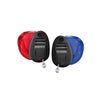 Listening Lab Malaysia offers a selection of best-rated hearing aids.
Listening Lab Malaysia offers a selection of best-rated hearing aids.

Dust, peanuts, and shellfish are just few of the many things that people can be allergic to. Do you have allergies? Do you show signs of being sensitive to specific food or objects? Did you know that these might trigger hearing loss? So, before you even get to the point of needing hearing aids, find out how your condition may possibly result to decline in hearing.
What are allergies?
Before we dig deeper into this connection, let us set the context first. Hearing loss is the most common chronic condition worldwide. It is our body’s reaction to a foreign substance such as pollen, dust, food, or a specific material that doesn’t normally cause a reaction to other people. The immune system produces antibodies that identify the “foreign” element as harmful when it actually is not. Common effects of this include inflammation of the skin, sinus, airways, and digestive system.
How do allergies affect hearing?
The antibodies produced by the immune system release histamine. This is what causes the allergic response of our body. As a stimuli, we sneeze, itch, and congestion increases. These causes our body’s mucus production to increase. As a result, we experience conductive hearing loss. Conductive hearing loss is when there is something that is blocking the sound waves from its usual path for our process of hearing.
The increase in production of mucus can affect the normal functioning of the Eustachian tube. This part of the ear is normally closed and only opens in daily activities such as swallowing, chewing, and yawning. These activities allow air to pass from the middle ear to the nasopharynx. With allergies, they can become blocked partially or even completely. When the Eustachian is unable to equalize pressure, it can cause complications to the ears.
Also, when our body’s reaction to allergies are itching and swelling of the different parts of our ears, it can cause difficulty in hearing clearly. When allergies cause fluid build-up in the ears, this can also result to conductive hearing loss. The feeling is as if your ears are full or clogged. This build-up can also be risky because bacteria can grow in the fluid and further complicate your hearing with ear infections.
What are the three types of allergy-related hearing loss?
Our ear is divided into three major sections namely the outer, inner, and middle ear.
- Outer ear — Itching and swelling can happen to the outer ear and the part that connects the outer ear to the middle ear, which is the ear canal.
- Inner ear — With allergies, swelling can happen, and even infections can damage the nerve endings in that part of the ear. Allergies also contribute to a person’s Meniere’s disease (link to here) or a feeling of spinning, hearing loss every now and then, tinnitus, and fullness or pressure in the ear. However, despite this being the most delicate part of your ears, it is also relatively resistant to allergies.
- Middle ear — The swelling reaction may also block the opening to our middle ear. This can cause fluid and pressure build-up, and may show signs that are similar to Meniere’s disease.
With your knowledge about hearing’s’ connection to allergies, you are now able to detect if your allergic reactions causes you to have difficulty hearing. To know more about hearing health, you may contact The Listening Lab at +603 7725 9334.











